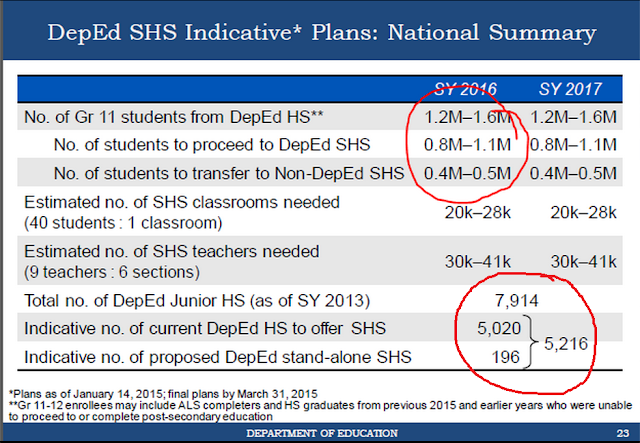Solving Requires Acknowledging the Problem First
Last month, Giovanni Tapang shared data from a survey made from September 2013 to June 2014 regarding the availability of laboratory facilities for science instruction in basic education. The survey shows that "23% of teachers do not have access to a laboratory and only 37% have access to a dedicated laboratory fit to what he/she is teaching". The lack of access to laboratory equipment imposes a huge stumbling block for an inquiry-based approach to learning science, as well as a spiral curriculum. Both inquiry and spiral approaches are major elements of DepEd's K+12. A new curriculum cannot address problems in resources especially when it requires greater resources. This is simple math.
There are innovations in science education equipment that are now available yet as related in a post on this blog last year, Philippines DepEd Seriously Lacks Innovation, these resourceful ways of addressing limited resources do not exist in DepEd's plans. Instead, DepEd is seemingly suspended in outdated kits and equipment.
Sound bites can easily misinform but good data do not. Even numbers from DepEd show that resources are not adequate for its new curriculum. The following slide from DepEd's presentation in its midterm report for the new curriculum shows that there are not enough high schools to offer the additional two years:
The numbers above do not even take into account that about 7 percent leave school in elementary and another 7 percent do not finish high school (from Phl dropout rates rising since 2007). Proponents of the new curriculum insist that curriculum changes are necessary even if resources are not yet adequate. This seems logical especially when it appears to be impossible to address completely the shortages. Thus, if the ability to provide a quality 10-year education is made a requirement for a 12-year basic education program then such curricular reform will never happen. This sounds reasonable except that it violates the goal of providing education for all. Creating new problems (or new needs) is not really a good way of solving a problem.
There are innovations in science education equipment that are now available yet as related in a post on this blog last year, Philippines DepEd Seriously Lacks Innovation, these resourceful ways of addressing limited resources do not exist in DepEd's plans. Instead, DepEd is seemingly suspended in outdated kits and equipment.
 |
| Expensive and outdated equipment that DepEd chooses (left) versus cheaper and more environmentally-friendly kits for science laboratories (right). |
The numbers above do not even take into account that about 7 percent leave school in elementary and another 7 percent do not finish high school (from Phl dropout rates rising since 2007). Proponents of the new curriculum insist that curriculum changes are necessary even if resources are not yet adequate. This seems logical especially when it appears to be impossible to address completely the shortages. Thus, if the ability to provide a quality 10-year education is made a requirement for a 12-year basic education program then such curricular reform will never happen. This sounds reasonable except that it violates the goal of providing education for all. Creating new problems (or new needs) is not really a good way of solving a problem.


Comments
Post a Comment